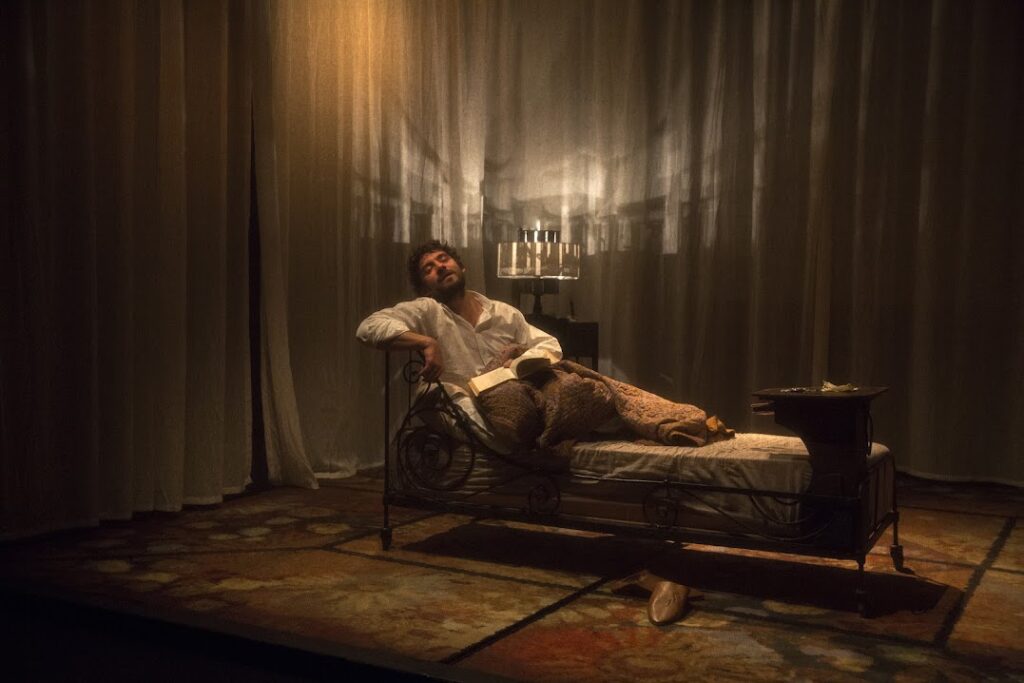Robert Renucci creates at the Criée de Marseille Oblomov and offers a new reading of the novel through a play with sharp aesthetics. The viewer’s experience is a tender and uplifting journey into a man’s psyche.
Renucci was appointed director of the national drama center les tréteaux de France in 2011. Recently he created a refined tetralogy of four emblematic plays by Racine: Berenice, Britannicus, Phaedrus and Andromache. and it is in July 2022 thathe took over the direction of the Criée national theater of Marseille.
A new resistant Oblomov
Oblomov is no ordinary character; it is a Russian myth which belongs to this Slavic culture which gave the character a noun: Oblomovism which still today questions us in a malaise between reprobation and fascination. If there is in Oblomov the Russian soul there is also in him a universal that Robin Renucci and his accomplice Nicolas Kerszenbaum suggests reading differently.
We knew Epinal’s image of a limp Oblomov, a kind of neurasthenic prevented, or contemplative enjoyer. With Renucci, Oblomov possesses an intention, a thought which, if he were not working alone, we could qualify as political; he makes a choice; he chooses not to adapt to the changing world; he chooses not to face his time any longer; he chooses not to leave his home; he chooses not to discover the world through travel, through work; he chose to step back from a new world centered on productivity, market exchange and soon globalization.
Oblomov resists in his own way the disappearance of his world. His procrastination, his contemplative inclination, his inextensible love for an old Russia escaping from modernity are all gestures of a genuine act of passive resistance. Also, we no longer have to accuse him of parasitism when he chooses in the last season to submit to the tenderness and hospitality of his owner, herself definitively convinced that the world to come will be without her.
A romantic beauty
The scenography proposed by Samuel Poncet amazes; it accompanies perfectly the new reading of Oblomov. The show revolves around four acts which are the four seasons of Oblomov’s life. First, his spring during which he spends a whole day in his room; a season when he does not go out but during which he dreams of his childhood, the only fixed point of his existence, between romanticism of the past and detestation of the present. In the summer, Oblomov meets Olga and love surprise. He finds himself disconcerted because he did not know that he could be jostled like this by a desire as strong as it is fragile and which will not last. In the fall Oblomov tries to live up to the love he has for Olga and that Olga has for him. But in winter it is decay, renunciation, adaptation to a certain mediocrity but it is also this strange happiness of a form of completeness in a comfort that no longer depends on the world gesticulating around him.
The decor is marvelous in meaning: a central square, a sort of cage open on all sides. This cube is both an isolation room and a mini-scene of a puppet within which a histrionic Oblomov unfolds. There is played out another scene, intimate, of which he is the only spectator. Oblomov does not refuse life. He lives in his way and according to his desire.
Oblomov from the origins
The acts are interspersed with damn judicious inter-scenes around a Russian nanny who tells the nursery rhyme of the pike, a tale where a child finds a paperback that allows him to realize all his desires without doing anything. This maternal, nurturing, reassuring and protective image recounts this lost paradise of childhood where Oblomov takes refuge in each of his dreams. We perceive what he refuses to submit to and also what he would have to renounce if he made the choice of Stakhanovist modernity: a lost paradise.
It is the same actress who simultaneously plays the nanny and at the same time the landlady with whom he takes refuge forever. Lisa Toromanian is fantastic because she knows how to embody the two mental universes of Oblomov. The other actors are in tune. Pauline Cheviller is moving as Olga. Guillaume Pottier succeeds with accuracy in defending a never apathetic but dreamy Oblomov, always a little elsewhere,
Renucci delicately innovates and returns to a first reading of the work, at the time of its publication in 1859 when Oblomov was the symbol of an old Russia frightened by the advent of modernity.
Beautiful, new and uplifting.
Oblomov by Nicolas Kerszenbaum after Goncharov.
Directed by Robin Renucci
Translation by Luba Jurgenson
With Gérard Chabanier, Pauline Cheviller, Valéry Forestier, Guillaume Pottier, Lisa Toromanian, Amandine Robilliard (cello and musical improvisation).
Scenography by Samuel Poncet
Light by Julie-Lola Lanteri
Costumes by Jean-Bernard Scotto
Decor creation by Eclectik Sceno
Musical design and transcription by Emmanuelle Bertrand
Assistant director Luna Muratti
Photo credit © Nabil Boutros
Credit : Nabil Boutros
We would like to say thanks to the writer of this short article for this awesome content
Robin Renucci offers at the Criée de Marseille, a renewed and exciting Oblomov
You can find our social media accounts as well as other related pageshttps://nimblespirit.com/related-pages/

